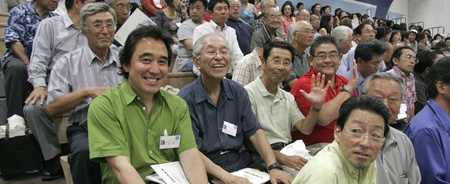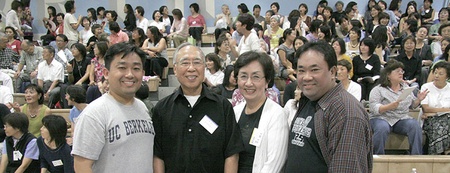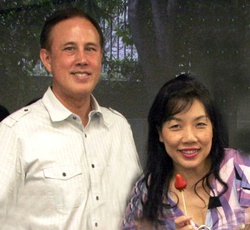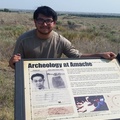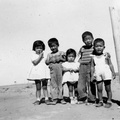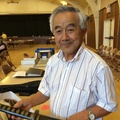If you’ve read my previous article, Ode to Joy (An die Freude ) , you know that several hundred Japanese Nationals, Japanese Americans, and I joined a choir group to learn to sing the choral in Beethoven’s 9th Symphony in German for a performance at the Disney Concert Hall.
As this is being written, eight months after the project started and just days away from our Disney Concert Hall debut, we are excitedly taking part in the final two combined group rehearsals. Our rehearsal yesterday with the four professional soloists was held in the gymnasium of North High School in Torrance
This picture was taken early, before the bleachers were completely filled with 381 choir members. The final joint rehearsal will be held in the Kyoto Grand Hotel with the Asia American Symphony Orchestra and again with the four excellent soloists and the conductor, David Benoit.

(L-R): Dr.Hiroshi Taguchi, Tenor Katsumi Narita,Soprano Keiko Soprano Takeshita, Alto Silvia Vasquez, Bass Jinyoung Jang and conductor David Benoit.
The excitingly anticipated concert at Disney Hall will have already taken place by the time this article is posted, but before describing that concert phase, I want to introduce a few other choir members that are participating in this intriguing “once in a lifetime” choir experience to illustrate the goal for this “Bridging USA & Japan” endeavor “to foster a better relationship between Japanese Americans and Japanese Nationals.” From the fertile choir fellowship that grew—and if there were the time and space—there could be 380+ interesting stories to tell.
Initially, I thought I had already met all of the choir members that I would get to know on this musical adventure, but everyone was so open and friendly, I easily met others. Those I met earlier are pictured here. We were happy to learn that we would be seated relatively together in the Disney Hall performance. We started referring to each other as “Bruders” based on part of lyrics, “alle menschen verden bruder (All mankind are brothers).”
Taking a break in the coolness outside of the hot gymnasium, I met Jyun Takagi and learned that he, a brother, and both his parents were in the choir! After the break, I met his family. In the photo L-R is his brother, Yutaka; his father, Tetsuya; his mother, Akiko; and Jyun. The eldest son, Ryo, lives away, but Jyun said if he were here, he would have been in the choir as well. The Takagi family came to the United States in 1969. Later, Jyun spent ten years back in Japan to further his education. After graduating, he went to work with IBM Japan and did a stint at the Nagano 1998 Winter Olympics. He returned to the U.S. shortly after.
Tetsuya Takagi learned about this choir project from a friend who belongs to another choir group. Tetsuya got his family involved even before the Rafu Shimpo article announcement came out. So, for eight months, the parents practiced in Orange County, and Jyun and Yutaka practiced and learned Beethoven’s 9th choral in Torrance. They, unlike their parents, have no prior choir experience. Akiko sings alto, and the men all sing bass.
Looking about for another subject, I had been noticing a Hakujin (Caucasian) gentleman who belonged to the DT#9 (Downtown) Beethoven choir. He turned out to be Max Zerkelbach, who was born in Tokyo, in 1952. His father was an officer in the U.S. Army and later met his mother, a former typist for the Emperor during WWII. The Zerkelbach family moved to the United States with 4-month-old Max.
When asked about being Hapa, Max said, “I’m proud to be what I am and especially Japanese because I’m a Samurai at heart…” Max said, “I have been happily married to a Japanese lady for 11 years.” His wife, Saeko, who sings soprano in the choir, is also a koto and Ikebana teacher.
Saeko learned about this choir project from her friend, Fusako-san, who belongs to the “Mori no kai” choir group and whose husband did the sound engineering for the Walt Disney Concert Hall. Fusako Toyota is a member of the chorus committee and sings soprano in the choir.
Max has choir experience, having sung in the Japanese Elementary 6th grade choir class. He also sang in the Kyodo Pasadena choir group called the “Himawari Group.” Fluent in Japanese and English, Max is of German extraction and can proudly pronounce the German lyrics in An die Freude quite easily.
After most of the DT#9 rehearsals, we would head for one of the many yogurt shops in Little Tokyo. This became a tradition led by Bill Watanabe, the Director of the Little Tokyo Service Center (LTSC). We would kid him for leading a “harem” because he was usually accompanied by female singers; a few of them also worked for him at the LTSC. One of the women came up with the term “Brudettes,” so we became the Bruders and Brudettes!
These shots were taken after our last rehearsal at the Kyoto Grand Hotel. We didn’t have as many as usual at the yogurt shop that evening. When everyone did show up, we’d just about take over the whole yogurt shop, but this was the eve of the concert, so we figured the others went home early to get a good night’s rest for the long exciting concert day ahead.
© 2009 Gary T. Ono



